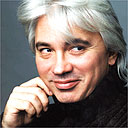Genuine stars are rare in the classical music world, though Russian baritone Dmitri Hvorostovsky ranks among them. He is glamorous and audiences love him. The moment he steps on to the platform, there are cheers.
He plays up to the sex symbol image a bit, spattering his programme with suggestively titled numbers like Extase and Frenzied Nights; the former by Duparc, the latter by Tchaikovsky. Applause spontaneously follows every song.
Sometimes he likes it, basking in the adulation like a contented cat. At others it annoys him: enthusiastic clapping after the first song of Mussorgsky's Sunless gets no response and his public is silent until the cycle is over.
He is worth the fuss, partly because his voice is one of the greatest in the world, partly because he refuses to rest on his laurels, continues to develop as an artist and refrains from indulging in tours to promote his latest CD.
Much of his programme here is new: this is the first time, to my knowledge, that he has tackled Sunless in the UK. It is Mussorgsky's grimmest work and deals with one man's descent into madness and suicide after a chance encounter with his ex-lover.
Hvorostovsky and pianist Mikhail Arkadiev generate intensity: as Hvorostovsky's voice ebbs and flows through massive crescendos and diminuendos while Arkadiev surrounds him with splashes of pianistic colour.
His incursions into the French repertoire have been few, though now he is singing Duparc like one born to it. Extase, with its intimations of post-coital languor, gets his audience going and elsewhere he is equally astonishing, whether filing his voice down to a rapt whisper while contemplating the sleeping Phydilé or infusing his tone with a hint of metal for the nightmarish tintinnabulations of La Vague et la Cloche.
He also gives us Ravel's Don Quichotte à Dulcinée, filling its hispanically inflected lines with shadows of sadness and regret. For his encore, he erupts into Iago's blasphemous Creed from Verdi's Otello, rolling his eyes heavenwards at the deity he curses and making you wonder how he would sing the role in its entirety. Staggering stuff, all of it, leaving you in no doubt that he is one of the great recitalists of our time.





